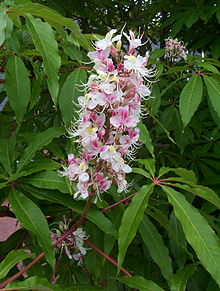Aesculus indica
Appearance
| Aesculus indica | |
|---|---|

| |
| Scientific classification | |
| Kingdom: | Plantae |
| Clade: | Tracheophytes |
| Clade: | Angiosperms |
| Clade: | Eudicots |
| Clade: | Rosids |
| Order: | Sapindales |
| Family: | Sapindaceae |
| Genus: | Aesculus |
| Species: | A. indica
|
| Binomial name | |
| Aesculus indica | |
| Synonyms[1] | |
|
Pavia indica Wall. ex Cambess. | |
Aesculus indica (or the Indian or Himalayan Horse Chestnut) is a tree. It grows to about 30 metres (98 ft) with a spread of about 12 metres (39 ft). It best grows in -15°C (5°F), USDA zones 7-9.[2] It is in flower from June to July. The seeds ripen in October. The flowers are hermaphroditic. There are many white blossoms during May and June. The plant is pollinated by bees. Its leaves are 10–20 cm long by 2–6 cm wide. The mature tree forms a round canopy.
References
[change | change source]- ↑ "Aesculus indica (Wall. ex Cambess.) Hook. | Plants of the World Online | Kew Science". Plants of the World Online. Retrieved 2020-02-05.
- ↑ Aesculus indica Fact Sheet ST-63 http://hort.ufl.edu/database/documents/pdf/tree_fact_sheets/aesinda.pdf
